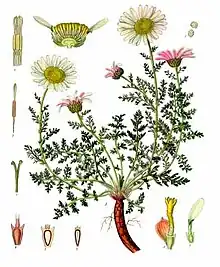Anacyclus
Anacyclus is a genus of plants in the family Asteraceae described by Linnaeus in 1753.[5][6] Annuals or herbaceous perennials, they are cultivated for their fern-like leaves on creeping, radiating stems and daisy-like flowers. They are frost-hardy but may tolerate winter temperatures below −5 °C (23 °F) if grown in well-drained soil.[7]
| Anacyclus | |
|---|---|
 | |
| Anacyclus pyrethrum[1] | |
| Scientific classification | |
| Kingdom: | Plantae |
| Clade: | Tracheophytes |
| Clade: | Angiosperms |
| Clade: | Eudicots |
| Clade: | Asterids |
| Order: | Asterales |
| Family: | Asteraceae |
| Subfamily: | Asteroideae |
| Tribe: | Anthemideae |
| Genus: | Anacyclus L. (1753) |
| Type species | |
| Anacyclus valentinus | |
| Synonyms[4] | |
| |
Anacyclus species are native to stony or sandy slopes in southern and western Europe, North Africa, and the Middle East.[4][8]
The roots of A. pyrethrum are known as pellitory in Europe and akrakara in India. The root is imported mainly from Mediterranean countries. Because of its powerful irritant action, in Ayurvedic medicine the root is considered a stimulant and is often an ingredient of aphrodisiacs and nervous stimulants used in facial palsy, paralysis, hemiplegia, fibromyalgia, etc.[9]
- Anacyclus anatolicus Behçet & Almanar
- Anacyclus ciliatus Trautv.
- Anacyclus clavatus (Desf.) Pers.
- Anacyclus homogamos (Maire) Humphries
- Anacyclus inconstans Pomel
- Anacyclus latealatus Hub.-Mor.
- Anacyclus linearilobus Boiss. & Reut.
- Anacyclus maroccanus (Ball) Ball
- Anacyclus monanthos (L.) Thell.
- Anacyclus nigellifolius Boiss.
- Anacyclus officinarum Hayne
- Anacyclus pyrethrum (L.) Link
- Anacyclus radiatus Loisel.
- Anacyclus valentinus L.
References
- 1897 illustration from Franz Eugen Köhler, Köhler's Medizinal-Pflanzen
- "Anacyclus". Index Nominum Genericorum. International Association for Plant Taxonomy. 1996-02-09. Retrieved 2008-06-16.
- "Anacyclus". International Plant Names Index (IPNI). Royal Botanic Gardens, Kew; Harvard University Herbaria & Libraries; Australian National Botanic Gardens. 2008-06-16.
- Flann, C (ed) 2009+ Global Compositae Checklist
- Linnaeus, Carl von in Latin
- Tropicos, Anacyclus L.
- Brickell, Christopher, ed. (2008). The Royal Horticultural Society A-Z Encyclopedia of Garden Plants. United Kingdom: Dorling Kindersley. ISBN 9781405332965.
- Altervista Flora Italiana, genere Anacyclus includes photos and European distribution maps for several species
- Puri, H.S. (2003) Rasayana: Ayurvedic Herbs for Longevity and Rejuvenation. Taylor & Francis, London
- "Anacyclus L." African Plants Database. South African National Biodiversity Institute, the Conservatoire et Jardin botaniques de la Ville de Genève and Tela Botanica. Retrieved 2008-06-16.
- Botanic Garden and Botanical Museum Berlin-Dahlem. "Details for: Anacyclus". Euro+Med PlantBase. Freie Universität Berlin. Retrieved 2008-06-16.
- UniProt. "Anacyclus". Retrieved 2008-06-16.
External links